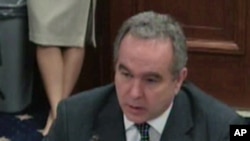U.S. Assistant Secretary of State for East Asian and Pacific Affairs Kurt Campbell recently testified before a Congressional committee.
"Underpinning our strategy is a steadfast commitment to our belief in the universality of democracy and our respect for human rights," Assistant Secretary Campbell said.
"The U.S. commitment to these values defines the unique aspect of U.S. relations with Asia-Pacific nations, and is an intrinsic and indispensable aspect of our character as a nation. It is one of the best and most important contributions that we can offer the region."
"We will continue to work with countries to combat the scourge of trafficking in persons," said Mr. Campbell, "to promote the rights of women and children, and foster greater religious dialogue among the many communities of faith in the region."
"We continue to press for the restoration of democracy in Fiji, as well as to promote good governance, rule of law, and respect for human rights in Vietnam and China."
In Burma, the United States maintains extensive financial, trade, and travel sanctions that target regime authorities who thwart democracy and disrespect human rights.
"Our message remains clear and consistent," Assistant Secretary Campbell said. "[A]bsent concrete progress in key areas of democracy and human rights, our sanctions will remain in place."
To ensure that the promotion of human rights, the rule of law, and the development of civil society remain strong pillars of engagement with the Asia-Pacific region, the United States will continue to adopt new and creative approaches, harnessing innovative technologies that make use of advances created in the information age, and working to internationalize human rights.
The recent establishment of institutions such as Indonesia's Bali Democracy Forum, and the Association of Southeast Asian Nations' Intergovernmental Commission on Human Rights, are positive steps in this regard.
"The freedom to speak one's mind and to choose one's leaders, the ability to access information and worship how one pleases are the bases of stability," Assistant Secretary Campbell concluded. "The United States will continue to speak for those on the margins of society, [and] encourage countries . . . to respect the internationally recognized human rights of their people."
Human Rights Policy In Asia-Pacific

"Underpinning our strategy is a steadfast commitment to our belief in the universality of democracy and our respect for human rights."



